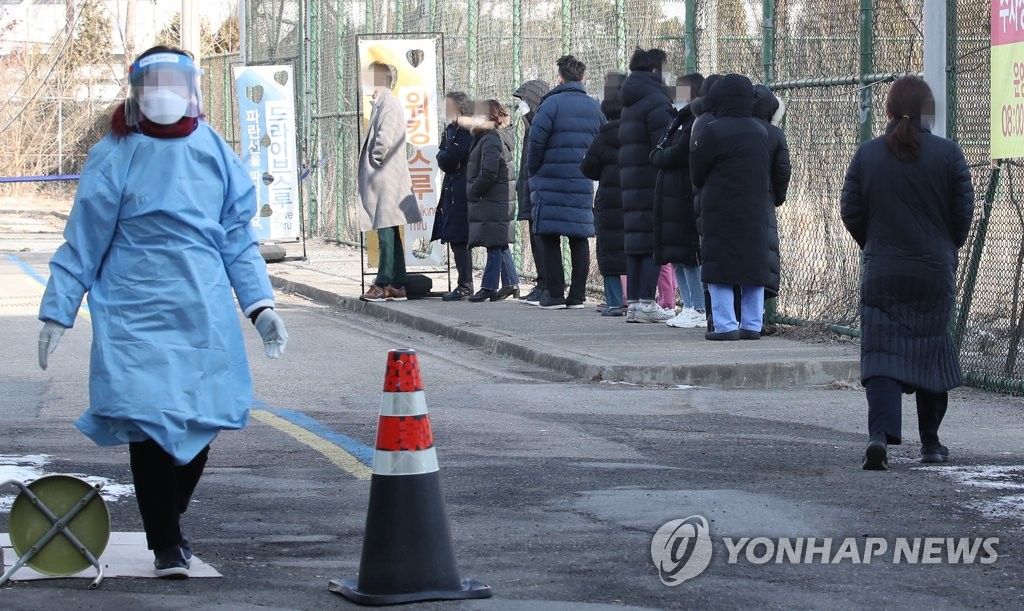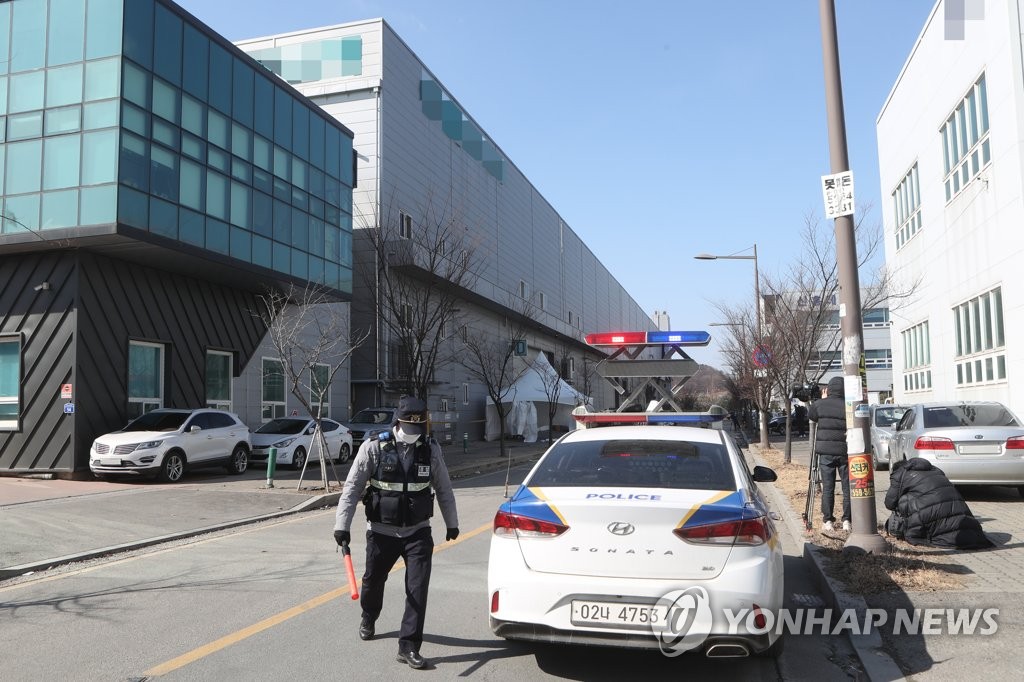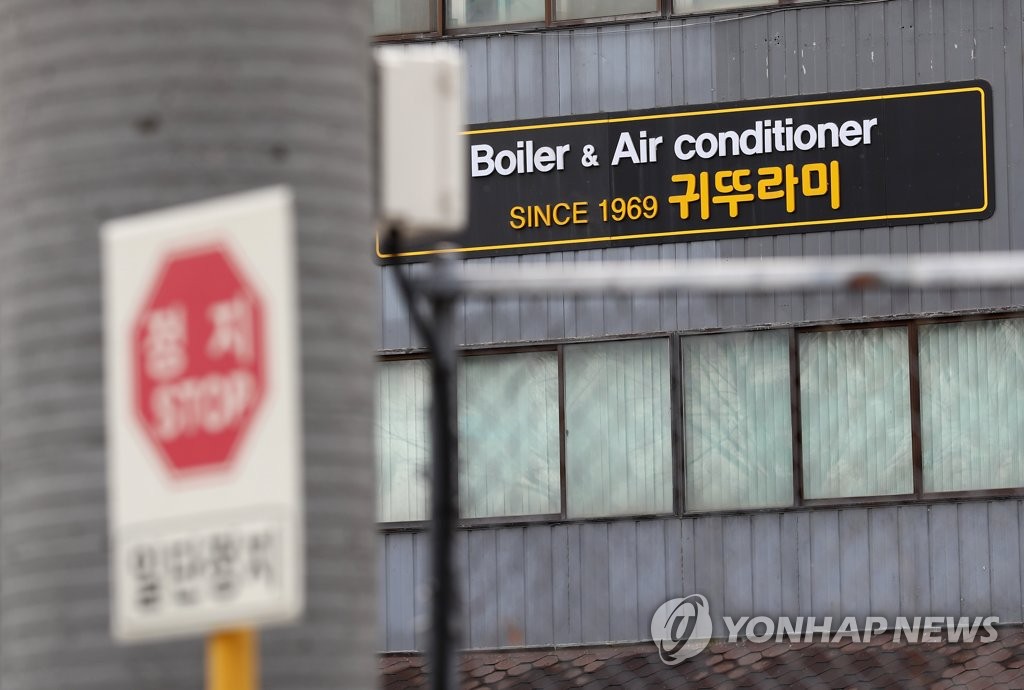- California Assembly OKs highest minimum wage in nation
- S. Korea unveils first graphic cigarette warnings
- US joins with South Korea, Japan in bid to deter North Korea
- LPGA golfer Chun In-gee finally back in action
- S. Korea won’t be top seed in final World Cup qualification round
- US men’s soccer misses 2nd straight Olympics
- US back on track in qualifying with 4-0 win over Guatemala
- High-intensity workout injuries spawn cottage industry
- CDC expands range of Zika mosquitoes into parts of Northeast
- Who knew? ‘The Walking Dead’ is helping families connect
New virus cases most since early January, post-holiday resurgence looming
South Korea’s daily new coronavirus cases increased by the most in more than a month to over 600 on Wednesday, prompting concerns over a virus resurgence after the Lunar New Year holiday amid eased social distancing rules.
The country reported 621 more COVID-19 cases, including 590 local infections, raising the total caseload to 84,946, the Korea Disease Control and Prevention Agency (KDCA) said.
The country added four more deaths, raising the total to 1,538.
Wednesday’s caseload was the highest since Jan. 10 when 657 cases were reported.
As of 6 p.m. Wednesday, the country added 476 more cases, up 13 from the same time Tuesday, according to health authorities and local governments. Daily infections are expected to exceed 600 Thursday given the figures.
New cases are counted until midnight each day and announced the next morning.



People stand in line to get COVID-19 tests at a temporary screening station in Soonchunhyang University Hospital in central Seoul on Feb. 17, 2021. (Yonhap)
The daily caseload remained in the 300s from Saturday to Monday due mainly to less testing over the holiday that began Thursday of last week, but it bounced back to over 400 on Tuesday when more people got tested.
Health officials said they were closely monitoring the latest uptick in new virus cases to figure out whether it is an early sign of virus resurgence or the result of the increased testing after the holiday season.
A series of infections at religious facilities, hospitals and industrial plants have posed challenges to the country’s antivirus efforts, coupled with the spread of more contagious variants.
South Korea added five new cases of more transmissible COVID-19 variants from Britain to raise the total to 99. All of them were foreigners living in the nation and tested positive after coming in contact with their relatives from abroad.
Authorities warned of a potential hike in new cases tied to holiday traveling and relaxed social distancing rules that went into effect Monday to help small business owners suffering from losses.
The traffic on the Lunar New Year’s day on Feb. 13 was down 29 percent from a year earlier, but it was 18.9 percent higher than the daily average in February, the KDCA said.
“The number of new cases has been rising recently. If traffic continues to rise, it could lead to a resurgence of the fourth wave of pandemic,” Sohn Young-rae, a senior health official, said in a briefing.
The Seoul metropolitan area, home to half of the nation’s 52 million population, is under Level 2 distancing — the third highest in a five-tier system — and other areas are at Level 1.5.
The adjustment allows restaurants, coffee shops, gyms, nightclubs and bars in Seoul and the surrounding Gyeonggi Province to remain open for an hour longer until 10 p.m.
Health authorities said they are mulling revising the current distancing scheme in a more sustainable way for business owners, but they said the new system could only go into effect next month at the earliest if the country’s virus curve flattens in the next two weeks.
“We will continue to work on revising the social distancing scheme,” Sohn said.
If the number of new cases continues to rise, authorities could consider strengthening regulations on businesses to minimize people’s activities, Sohn added.
South Korea plans to administer its first inoculations against the new coronavirus on Feb. 26 with AstraZeneca’s COVID-19 vaccine, but the inoculation of seniors aged 65 and older will be put on hold amid efficacy concerns.
In a meeting of the National Assembly health and welfare committee, KCDA Commissioner Jeong Eun-kyeong said the government plans to begin vaccination of senior residents and workers at nursing homes within the second quarter.
The government will make the decision next month after consulting with experts, she said, adding Pfizer, AstraZeneca and Novavax vaccines are under consideration.
Health authorities and related agencies will conduct simulation for the transport of AstraZeneca’s vaccine and its inoculation program Friday, the KDCA said.
The government has secured vaccines for 79 million, more than the nation’s population, through deals with the World Health Organization’s global vaccine COVAX Facility project and separate contracts with foreign drug firms.
Starting from Wednesday, Celltrion Inc.’s anti-COVID-19 monoclonal antibody treatment is available at local medical institutions free of charge, the KDCA said.
Celltrion’s CT-P59, the nation’s first homegrown treatment, will only be administered to patients with health authorities’ approval, with most patients likely to be aged over 60 or those with chronic illnesses, KDCA noted.
Of the 590 locally transmitted cases, 247 cases were reported in Seoul and 147 in the surrounding Gyeonggi Province. Incheon, 40 km west of Seoul, had 21 new cases.
Mass testing of workers, mostly foreigners, at a factory in Namyangju, southeast of the capital, found that 114 were infected with the virus, while five were still waiting for results.
Authorities said they will conduct preemptive testing on about 1,200 workers at 59 companies in the city’s industrial complex to detect potential new cases.
They warned of additional cases from the industrial complex, as most foreign workers live in factory dormitories, which pose a greater risk of group infections.
Soonchunhyang University Hospital in central Seoul reported 22 new cases among its medical staff, patients and their caregivers, raising the total to 140.
A boiler factory in Asan, about 100 kilometers south of Seoul, added 22 more cases among workers, raising the total to 114. Hanyang University Medical Center in eastern Seoul has also registered 109 cases.
The KCDC said thirty-one virus cases were from abroad, with seven from the United States, five from France and three from Tanzania.
The number of seriously or critically ill COVID-19 patients was 169, up three from the previous day.
The total number of people released from quarantine after making full recoveries was 75,360, up 809 from a day earlier.












